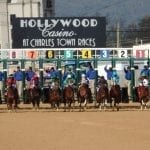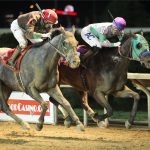LAUREL: FARRIOR HOPING PATIENCE PAYS OFF IN HEMP

Patience is a virtue, they say, and for horse trainers, it’s doubly so.
As for the trainers at Laurel Park and Pimlico these last few weeks? Well, Job’s got nothing on them. The Four Horsemen may not all have arrived, but there’s been the pestilence of an equine herpesvirus outbreak, plus rainy weather, canceled racing, and enough curveballs to strike out the side.
Take the case of Hemp. The Maryland-bred Super Ninety Nine gelding is trained by Anthony Farrior, whose Maryland string is in Barn One. That barn, right up at the head of the stretch, the barn from which for many years King Leatherbury ruled Maryland racing, was one of the four first placed under quarantine when equine herpesvirus struck the Laurel backside in early March.
In order to protect the wider horse population, for a period of time those four barns had limited training hours.
“We only had 40 minutes to train, for three weeks,” Farrior said.
It’s a complicated dance, the morning training routine, made moreso with limited time. Horses need to be tacked up, walked around, taken to the track to train, brought home, cooled out, bathed, fed.
That meant a juggling act. The trainer did what he could to keep his more promising runners – like the three-year-old Hemp – on a regular training schedule. Some other horses had more limited opportunities.
“It was tough,” Farrior said. “People here were nice. I gave them $20 a head, and I had, like, eight riders, so I could get three sets out. But, I mean, I didn’t have enough people to operate it all.”
- Middleburg Spring Races kick off major Va. jump season
 Champion Snap Decision looks for his fourth Temple Gwathmey win as the Middleburg Spring Races kick off Virginia’s jump season Saturday.
Champion Snap Decision looks for his fourth Temple Gwathmey win as the Middleburg Spring Races kick off Virginia’s jump season Saturday.
In the midst of all that, on March 17, Hemp, with jockey Kevin Gomez aboard, threw down a five-furlong bullet work in 59 seconds.
“It looked so easy,” Farrior said. “I asked Kevin when he came back, ‘What do you think he went in?’ He said, ‘1:02, 1:03?’ I said, ‘He went 59.’ He don’t feel like he’s moving very fast.”
He may not feel it, but the sophomore can move pretty fast, indeed. Hemp posted another bullet work April 2 and realized the fruits of his labors Saturday, April 10, when he romped to a five-length score in an allowance/optional claiming event at Laurel Park.
“I was happy to get a win,” Farrior said. “It’s been a while.”
“Hey, me too,” chimed in David Baxter, Hemp’s breeder and, as Narrow Leaf Farm, owner.
In fact, it was Farrior’s first Laurel win since March 6 — the day the first horse at Laurel showed symptoms of EHV-1 — and second since Hemp’s maiden score February 20. Farrior enjoyed it so much, he won two more on Sunday at Laurel.
Under Jevian Toledo, Hemp chased the pace outside early leader It’s Sizzling Time through the opening half-mile in 46.72 seconds. He overhauled the leader in upper stretch and went on to win by 5 ¼ lengths in 1:23.92 for seven furlongs.
- Middleburg Spring Races kick off major Va. jump season
 Champion Snap Decision looks for his fourth Temple Gwathmey win as the Middleburg Spring Races kick off Virginia’s jump season Saturday.
Champion Snap Decision looks for his fourth Temple Gwathmey win as the Middleburg Spring Races kick off Virginia’s jump season Saturday.
It was his first race beyond six furlongs – “Toledo said he got a little tired on the gallop-out, but it was his first time going seven-eighths,” Farrior said – and also the third time in four starts he’d raced on a wet surface. The sealed main track was rated muddy on Saturday.
“I’d like to get him on a fast track one day,” Farrior said.
That 59-second breeze had come on a fast track, as had Hemp’s five-length maiden victory. Hemp now owns two wins from four career starts, with earnings of $71,487.
As for the future, Farrior said they’d see how Hemp came out of his race and “go from there.”
He did allow, “He’s a Maryland-bred. I know [Baxter] likes to win the Maryland Million. That’s his goal in life.”
“That’s a long way away,” Baxter said of the October 23 Maryland Million.
It is a long way away, and if all goes well, there are a number of other races to be run, and won, in the meantime.
The team will just have to be patient. Fortunately, they’ve had plenty of practice.
LATEST NEWS














